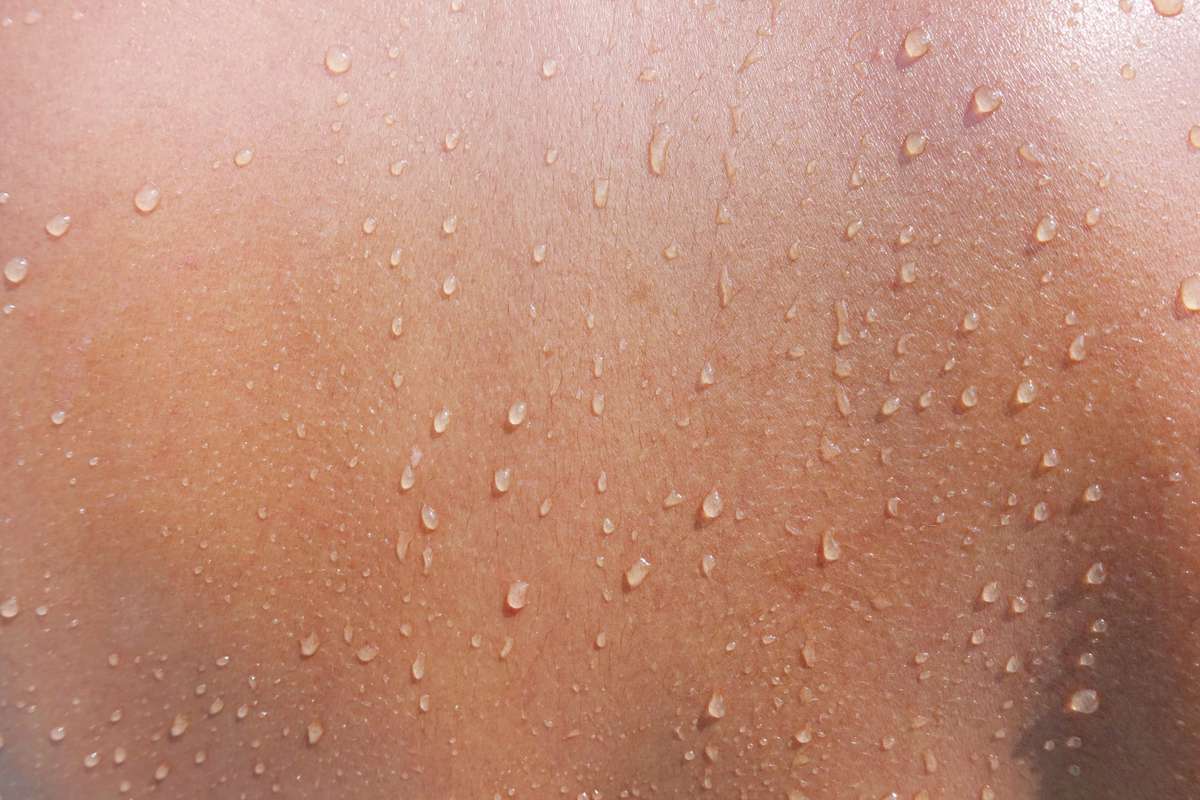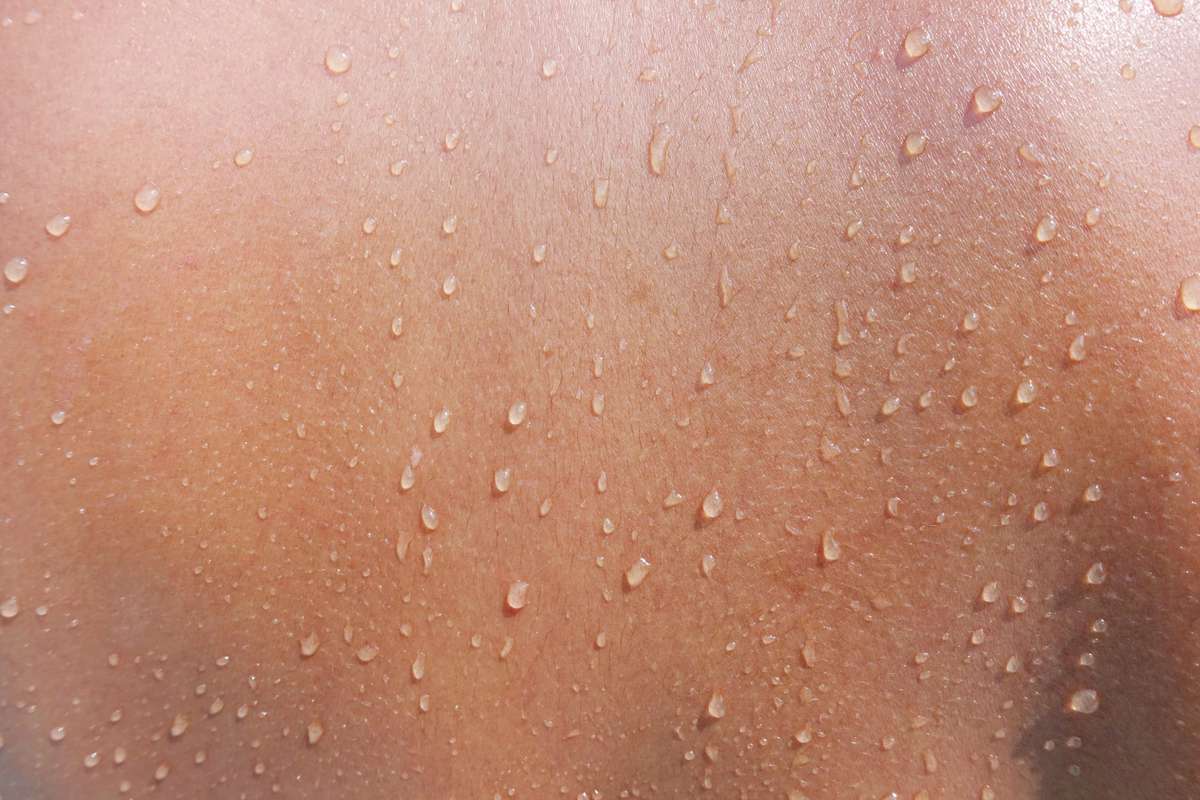Sweating too much? Sometimes excessive sweating is tied to an underlying medical condition or a drug you're taking. In medicine, it's known as generalized hyperhidrosis. It's also called secondary hyperhidrosis.
But don't confuse it with the most common type of hyperhidrosis, known as primary focal hyperhidrosis. (It's the type that begins early in life and typically affects the armpits, hands, feet, and head, per the Cleveland Clinic.)
So if you're sweating a lot, how can you tell if it's generalized hyperhidrosis—and what can you do about it? We asked dermatologists to explain.
 generalized hyperhidrosis , Water drops on woman skin, close up of wet human skin texture .
generalized hyperhidrosis , Water drops on woman skin, close up of wet human skin texture .
It's also known as secondary hyperhidrosis because it is "secondary" to something else, such as an underlying health condition, explains the International Hyperhidrosis Society (IHS).
As Cleveland Clinic points out, this type of hyperhidrosis tends to affect adults.
What are the symptoms of generalized hyperhidrosis?
One sign that you might be experiencing generalized hyperhidrosis rather than primary is that the sweating doesn't stop when sleeping, says Dee Anna Glaser, MD, dermatologist at SLUCare Physician Group in St. Louis.
In addition, the IHS says people with secondary hyperhidrosis might also experience:
- Sweating on larger or generalized areas of the body
- Onset of excessive sweating in adulthood rather than childhood or adolescence
What causes generalized hyperhidrosis?
There isn't a single cause of generalized hyperhidrosis, the IHS points out. Typically, profuse sweating stems from an illness or underlying health issue or is related to a drug that someone is taking.
Medical conditions
Many different medical conditions can either cause excessive sweating or have sweating as a side effect, per the IHS. Here are just a few:
- Infection or another illness that causes fever
- Alcoholism
- Diabetes
- Gout
- Heart failure
- Hypothyroidism
- Menopause
- Obesity
- Parkinson's disease
- Rheumatoid arthritis
- Pregnancy
- Lymphoma
- Encephalitis
Medicines
A multitude of medications can cause hyperhidrosis—the IHS lists hundreds of "potentially sweat-inducing" prescription and non-prescription drugs.
The IHS and recent review articles published by the US National Library of Medicine (NLM) and in American Family Physician highlight some of the common culprits. They include:
- Tricyclic antidepressants, including desipramine (Norpramin), nortriptyline (Pamelor), and Protriptyline (Vivactil)
- SSRI and SNRI antidepressants, such as fluoxetine (Prozac) and venlafaxine (Effexor)
- Pilocarpine, prescribed for dry mouth
- Zinc supplements (such as Cold-Eeze)
- Insulin
RELATED: Sweat Much? Here's Why and What You Can Do About It
How generalized hyperhidrosis is diagnosed
If you are experiencing excessive sweating, Dr. Glaser says the first step is for your doctor to determine if the sweating is caused by an underlying condition or medication. "This way we can refer them to their doctor who treats that condition or prescribes that medication," she tells Health.
To diagnose the issue, your doctor will likely review your medical history, conduct a physical exam, and ask you about any drugs or supplements you're taking, including over-the-counter medicine and supplements, per the IHS. Two tip-offs that it's generalized hyperhidrosis:
- You sweat when you sleep
- Your sweating came on suddenly during adulthood
If your doctor suspects that your sweating is secondary, laboratory tests may be ordered to rule out potential causes, according to the NLM review.
RELATED: 8 Hyperhidrosis Treatments to Help People Who Sweat Excessively
Generalized hyperhidrosis treatments
If your doctor traces the cause of your excess sweating to a condition that you have or a medicine or supplement you're taking, the solution might be to better manage your condition or switch medications, says Dr. Glaser.
Of course, it's not always possible to control sweating that's caused by an underlying medical condition, notes the American Academy of Family Physicians. And that's where treatments for primary focal hyperhidrosis, the other type of hyperhidrosis,may come into play.
Antiperspirants and topical wipes may help, for example. The IHS also suggests that doctors consider prescribing an oral medicine, such as an anticholinergic drug or beta blocker, to control the sweating.
To get more stories about health and wellness delivered to your inbox, sign up for the Healthy Living newsletter
